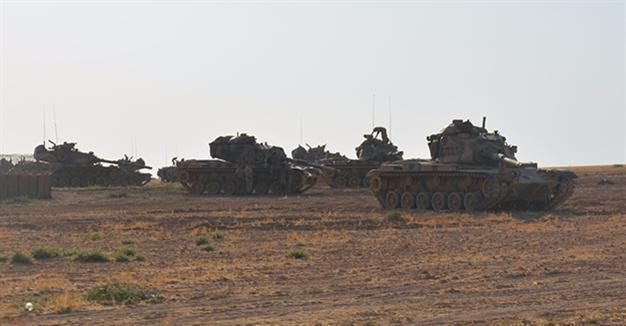Turkish army backs op to take ISIL-held town
GAZİANTEP / KİLİS

AA photo
The Turkish military backed operations to take a northern Syrian town along the Turkish border controlled by the Islamic State of Iraq and the Levant (ISIL) by shelling their targets on Aug. 23, after mortar shells and rockets hit two Turkish provinces.
Turkey’s shelling came as activists said hundreds of Ankara-backed rebels were preparing an offensive against ISIL to seize control of Jarablus, a town located just across from the southeastern Turkish province of Gaziantep’s Karkamış town.
Since late on Aug. 22, multiple mortar shells have fallen inside Karkamış, fired from ISIL positions in Jarablus. No one has been injured in the attacks.
Turkish howitzers launched retaliatory fire at ISIL positions, while the local municipality called on citizens not to leave their houses, Doğan News Agency reported. Police investigated the places where ISIL mortar shells landed inside Turkey.
Turkish artillery responded to the fire on Karkamış by hitting four ISIL positions around the jihadist-controlled Syrian town of Jarablus with around 60 shells.
Shelling from ISIL positions further west along the border also erupted on Aug. 22, when three rockets fired from an ISIL-held area in northwestern Syria crash landed in the city center of the southern Turkish province of Kilis. No one was injured in the attacks, after which Turkish artillery retaliated.
Citizens in Kilis were wary after the rockets landed in their city as a total of 21 people were killed in cross-border attacks by ISIL between January and May this year.
Multiple tanks, armored vehicles and heavy armed forces from the Gaziantep brigade were sent to the border.
Rami Abdul Rahman, the head of the Syrian Observatory for Human Rights, said the “Turkish shelling in Syria aimed to prevent the advance of troops backed by Kurds from Manbij towards Jarablus.”
Ankara sees the Syrian Kurdish Democratic Union Party (PYD) and its military wing, the People’s Protection Units (YPG), as offshoots of the outlawed Kurdistan Workers’ Party (PKK) and opposes a Kurdish-dominated corridor to be established along its border with Syria.
Washington, on the other hand, sees the PYD and YPG as effective and reliable partners on the ground in their fight against ISIL.
U.S. Vice President Joe Biden is scheduled to visit Ankara on Aug. 24 to meet Turkey’s leadership, with agreeing a unified strategy on Syria set to be a crucial issue.
Turkey had long been accused of not doing enough to hold a part of the border to prevent jihadists from passing in and out of Syria. Turkey has lately been building a 240-kilometers concrete wall in order to tighten security.
Meanwhile, Syrian regime forces and Kurdish fighters agreed on Aug. 23 to a truce in the northeastern Syrian city of Hasakeh after a week of clashes, a Kurdish official and Syrian state media said, according to AFP.
A statement distributed to journalists by a Kurdish official said the agreement included “a cease-fire and the withdrawal of all armed forces from the city.”
It said the Kurds and the regime would also exchange any detainees or wounded, and reopen roads blocked off during fighting.
The official told AFP that the YPG and Syrian forces would withdraw from Hasakeh, while the police forces of both the Kurds and the government would remain.
He added that the deal was brokered “under the auspices of Russian military officials.”
Syrian state television confirmed the truce was reached on the afternoon of Aug. 23.
A local journalist working with AFP said the city was quiet on Aug. 23, with several stores reopening in the city center.
On Aug. 22, Kurdish, regime, and Russian officials met in the coastal Hmeimim air base to hash out an agreement to put an end to the outbreak of violence in Hasakeh.
